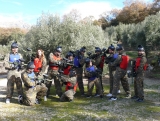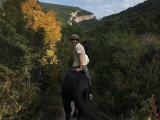Anyone who practices diving, regardless of their level, has experienced situations of varying degrees of distress underwater at some point. These situations range from mild anxiety due to changes or circumstances during a dive, to full-blown panic in the most severe cases.
The intensity of a diver's reaction to different underwater situations largely depends on their psychological traits—how each individual diver responds to the challenges that may arise during a dive.
Emotional Reactions in Recreational Diving
Several factors motivate people to take up an activity like recreational diving: experiencing new sensations, a thirst for adventure, witnessing firsthand what they've seen in media, discovering new perspectives, etc.
Today, accessing this sport is easy, and the physical requirements are minimal. However, predicting how a person will react to this new challenge is difficult, as responses to incidents vary based on personality. In some cases, reality differs significantly from initial expectations.
Increasing importance is being placed on psychological aspects in diving as a cause of accidents. Human error far outweighs equipment failure, with the primary cause often being a total loss of self-control linked to fatigue and physical exhaustion.
Stress
We can summarise stress as a mismatch between a person and their environment. It may arise from qualitative overload (lacking skills/knowledge to handle a situation) or quantitative overload (knowing how to respond but being overwhelmed by scale or time constraints).
A diver's reaction to internal or environmental imbalance is typically triggered by:
- Environmental factors: marine life, sea conditions, pressure effects, hypothermia, etc.
- Ergonomic factors: discomfort from wetsuits, poor equipment handling skills, inadequate breathing mixtures, etc.
- Physical exertion: high-intensity effort.
- Psychophysical factors: reduced sensory stimulation.
These stressors affect everyone. However, some situations may threaten a diver's safety when mental strain outweighs the physical challenges of the environment.
Any situation or stimulus—harmful or not—can be perceived as frustrating or dangerous, becoming a potential accident trigger.
When stress occurs underwater, two behaviours emerge: problem-solving and self-preservation. If stress persists, danger perception intensifies, and problem-solving gives way to pure self-protection.
Exhaustion follows, bringing helplessness and rapid decline in proactive response.
Panic Reaction (Anxiety Crisis)
Panic is a sudden, intense, irrational fear that overwhelms a person's adaptive capacity, leading to inappropriate behaviours and total loss of control. Fear is extreme stress where adaptation offers advantage. Evolutionarily, fear ensures survival by triggering threat avoidance (we likely exist because our ancestors feared appropriately).
Any unfamiliar, surprising, or physically demanding situation may trigger panic. The outcome depends on the diver's—and their buddy's—ability to regain control.
Common panic triggers include:
- Equipment issues: lost/flooded mask or regulator mouthpiece, air supply failure, negative buoyancy, etc.
- Dangerous marine life: encounters or injuries.
- Environmental hazards: poor visibility, currents, entanglement, fatigue, cold, or buddy separation.
Physiological effects of panic include adrenaline surge, tachycardia, hypertension, increased cardiac output, and ineffective hyperventilation.
We prepare for rapid reaction, but must then regain control by assessing options. Symptoms may include dry mouth, headache, temperature dysregulation (hot/cold flashes), dizziness, and other cognitive/social-physiological signs.
Preventive Measures
Given its sudden nature, prevention is challenging. Training is our best tool.
During diving courses, repetitive drills for emergency scenarios are vital. Teach self-control, emphasise physical preparation, and reinforce the adage: "In diving, two are one."
Though dive manuals seldom address panic deeply, we must acknowledge its possibility—for ourselves or our buddy—and prepare accordingly.
If stress arises, countermeasures include:
- Breath control: slow, deep breaths with extended inhalation/exhalation. Lower arousal by staying motionless on the seabed (or holding a rock), eyes closed, focusing on breathing.
- Situation reassessment: resolve the issue or abort the dive safely.
- Buddy support: their presence alone often helps. Face them, grip their BCD, and calm them with eye contact while solving the issue. Usually, knowing they're not alone suffices. In extreme cases, make a controlled ascent (if no decompression stops are needed), monitoring buoyancy/speed. Never allow an uncontrolled ascent. Exhale continuously during ascent. Secure buoyancy at the surface.
In summary: Stop, Breathe, Think, Act. If rescuing a buddy, adopt proper underwater protocols for an uncomplicated ascent. For most, recreational diving is an antidote to modern stress—enjoy it!











